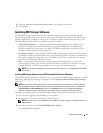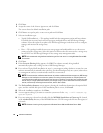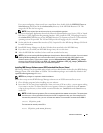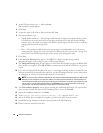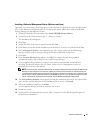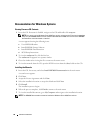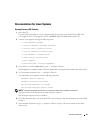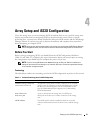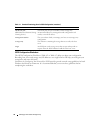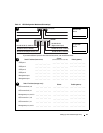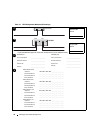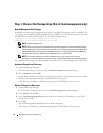
Setting Up Your iSCSI Storage Array 31
Array Setup and iSCSI Configuration
To use the storage array, you must configure iSCSI on both the host server(s) and the storage array.
Step-by-step instructions for configuring iSCSI are described in this section. However, before
proceeding here, you must have already installed the Microsoft iSCSI initiator and the MD Storage
Manager software. If you have not, refer to Software Installation and complete those procedures
before attempting to configure iSCSI.
NOTE: Although some of these steps shown in this section can be performed in MD Storage Manager
from a management station, the iSCSI initiator must be installed and configured on each host server.
Before You Start
Before you begin configuring iSCSI, you should fill out the iSCSI Configuration Worksheet
(Table 4-2 and Table 4-3). Gathering this type of information about your network prior to starting
the configuration steps should help you complete the process in less time.
NOTE: If you are running Windows Server 2008 and elect to use IPv6, use Table 4-3 to define your
settings on the host server and storage array controller iSCSI ports. IPv6 is not supported on storage
array controller management ports.
Terminology
The table below outlines the terminology used in the iSCSI configuration steps later in this section.
Table 4-1. Standard Terminology Used in iSCSI Configuration
Term Definition
CHAP (Challenge Handshake
Authentication Protocol)
An optional security protocol used to control access to an iSCSI
storage system by restricting use of the iSCSI data ports on both
the host server and storage array. For more information on the
types of CHAP authentication supported, see Understanding
CHAP Authentication.
host or host server A server connected to the storage array via iSCSI ports.
host server port iSCSI port on the host server used to connect it to the storage
array.
iSCSI initiator The iSCSI-specific software installed on the host server that
controls communications between the host server and the storage
array.



